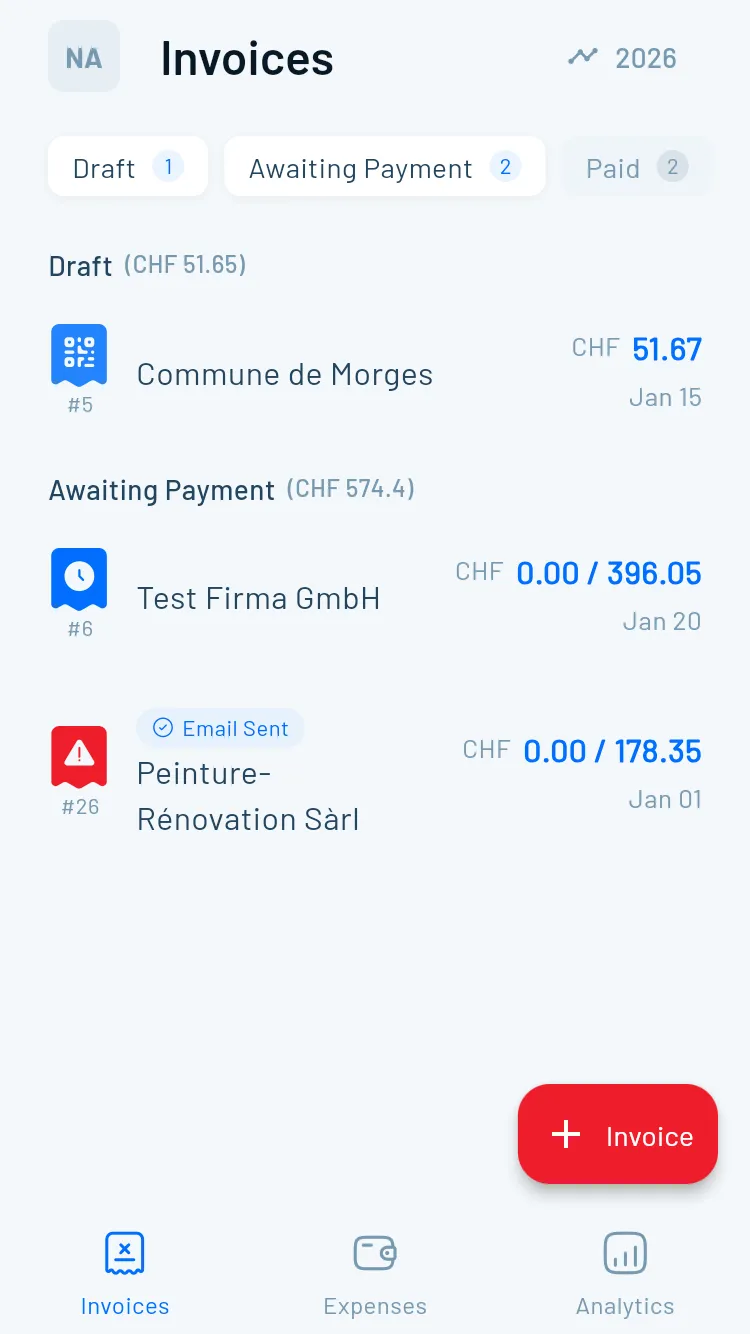Review & Plan
Preparation is key to a smooth transition.
- Review your contract for notice period requirements
- Calculate dates: today, notice period, last working day
- Optional: Have a phone/video conversation first
- Prepare written termination letter

Ending a client relationship is part of every freelancer's journey. Whether you're completing a project, moving on from a retainer, or dealing with a difficult situation, knowing how to terminate a freelance contract properly protects your professional reputation and keeps you legally compliant.

Unlike employment resignations, freelance contract terminations follow Swiss contract law—not employment regulations. This guide shows you exactly what you need to know, with ready-to-use templates in German, French, and English.
It depends on your contract.
Swiss law gives contractors and clients the freedom to end agreements "at any time without notice"—unless your contract specifies otherwise. Most professional service agreements include notice requirements, typically ranging from 2 weeks to 3 months.
Always check your contract first before sending a termination letter. Your contractual obligations override general legal defaults.
Before terminating any freelance contract in Switzerland, understand your obligations and protect your interests.
This is critical: Freelancers don't "resign" from clients. They terminate service agreements.
Why this matters: If you Google "termination letter Switzerland," you'll find mostly employment guides. Those rules don't apply to you as a freelancer.
Your contract is your rulebook. Everything—notice periods, termination rights, final deliverables—should be specified there.
Understanding the key differences ensures you follow the right legal framework.
| Aspect | Freelancer Contract | Employee Resignation |
|---|---|---|
| Legal Framework | Contract terms | Swiss employment law (OR Art. 335) |
| Notice Period | Per agreement | Statutory minimum applies |
| Trial Period | No statutory rules | 7-day notice during trial |
| Relationship | Services rendered | Part of company organization |
| Payment | Invoice-based | Salary-based |
Not all contract endings are created equal. Understanding your rights in different scenarios protects you from legal issues.
When work is done, it's done. Send completion notice and final invoice.
Both parties agree to end early. Document everything in writing.
Non-payment or fundamental violations allow immediate termination.
Fixed-term contracts expire automatically at end date.
Monthly services typically require 30+ days notice.
Contracts without terms usually need 1-3 months notice.
Keep it professional, clear, and documented.
✅ Your full name and address - Current contact information
✅ Client's full name and address - Company name if applicable
✅ Subject line - "Termination of Service Agreement" or "Beendigung des Dienstleistungsvertrags"
✅ Reference to your contract - Contract date or reference number
✅ Termination date - Last day of service, respecting notice period
✅ Request for written confirmation - Ensures both parties have clear record
Brief reason: Not legally required, but "pursuing other opportunities" or "restructuring my business" helps maintain goodwill
Transition offer: "Happy to help transition my work" shows professionalism
Thank you: Brief appreciation, even if relationship was challenging
Outstanding items: List deliverables, invoices, or files to be transferred
❌ Vague timing: "I'll be ending our contract soon" creates confusion. Give specific dates.
❌ Emotional language: Keep it factual, even if you're frustrated. This is a legal document.
❌ Forgetting the notice period: Ending immediately when your contract requires 30 days notice could trigger breach claims.
❌ No written record: Oral notification alone leaves you vulnerable to disputes.
❌ Missing final invoice details: Clarify when you'll send final billing and payment expectations.
Ready-to-use templates in German, French, and English. Copy, customize, and send.
English Version:
[Your Name]
[Your Address]
[City, Postal Code]
[Client Name]
[Client Company]
[Client Address]
[City, Postal Code]
[Date]
Subject: Termination of Service Agreement
Dear [Client Name],
I am writing to formally notify you of my decision to terminate our service agreement dated [Contract Date] for [describe services: "monthly marketing consulting services"].
In accordance with our contract terms, I am providing [number] days notice. My last day of service will be [Specific Date].
I have valued our professional relationship and appreciate the opportunity to work with [Company Name]. To ensure a smooth transition, I am happy to:
- Complete all work scheduled through [End Date]
- Provide documentation for ongoing projects
- Discuss handover with your new service provider
My final invoice covering work through [End Date] will be sent on [Invoice Date] with payment due within [number] days as per our standard terms.
Please confirm receipt of this termination notice in writing.
Thank you for your understanding.
Best regards,
[Your Signature]
[Your Name]
German Version (Deutsch):
[Ihr Name]
[Ihre Adresse]
[Stadt, Postleitzahl]
[Kundenname]
[Firma]
[Adresse]
[Stadt, Postleitzahl]
[Datum]
Betreff: Kündigung des Dienstleistungsvertrags
Sehr geehrte/r [Kundenname],
Hiermit kündige ich unseren Dienstleistungsvertrag vom [Vertragsdatum] für [Dienstleistung beschreiben] fristgerecht.
Gemäss den Vertragsbedingungen beträgt die Kündigungsfrist [Anzahl] Tage. Mein letzter Arbeitstag wird der [Datum] sein.
Ich habe die Zusammenarbeit mit [Firmenname] sehr geschätzt. Um einen reibungslosen Übergang zu gewährleisten, bin ich gerne bereit:
- Alle bis zum [Enddatum] geplanten Arbeiten abzuschliessen
- Dokumentation für laufende Projekte bereitzustellen
- Eine Übergabe mit Ihrem neuen Dienstleister zu besprechen
Meine Schlussrechnung für Leistungen bis zum [Enddatum] sende ich am [Rechnungsdatum] mit einer Zahlungsfrist von [Anzahl] Tagen gemäss unseren üblichen Konditionen.
Bitte bestätigen Sie den Erhalt dieser Kündigung schriftlich.
Vielen Dank für Ihr Verständnis.
Mit freundlichen Grüssen,
[Unterschrift]
[Ihr Name]
French Version (Français):
[Votre nom]
[Votre adresse]
[Ville, Code postal]
[Nom du client]
[Société]
[Adresse]
[Ville, Code postal]
[Date]
Objet: Résiliation du contrat de prestation de services
Madame, Monsieur [Nom du client],
Je vous informe par la présente de ma décision de résilier notre contrat de prestation de services daté du [Date du contrat] pour [décrire les services].
Conformément aux termes de notre contrat, je respecte un préavis de [nombre] jours. Mon dernier jour de service sera le [Date précise].
J'ai apprécié notre collaboration professionnelle avec [Nom de l'entreprise]. Pour assurer une transition en douceur, je suis disponible pour:
- Terminer tous les travaux prévus jusqu'au [Date de fin]
- Fournir la documentation des projets en cours
- Discuter de la passation avec votre nouveau prestataire
Ma facture finale couvrant les services jusqu'au [Date de fin] sera envoyée le [Date de facturation] avec un délai de paiement de [nombre] jours selon nos conditions habituelles.
Je vous prie de bien vouloir confirmer la réception de cette résiliation par écrit.
Je vous remercie de votre compréhension.
Cordialement,
[Signature]
[Votre nom]
Subject: [Project Name] - Completion & Final Invoice
Dear [Client Name],
This confirms the completion of [Project Name] as outlined in our agreement dated [Date].
All deliverables have been submitted:
- [Deliverable 1]
- [Deliverable 2]
- [Deliverable 3]
My final invoice (#[Invoice Number]) for [Amount] CHF is attached, with payment due by [Date].
Thank you for the opportunity to work on this project. I'd be happy to provide a reference or testimonial if helpful.
Best regards,
[Your Name]
[Your Name]
[Your Address]
[Client Name]
[Client Address]
[Date]
REGISTERED MAIL
Subject: Immediate Termination of Service Agreement Due to Material Breach
Dear [Client Name],
I am writing to notify you of the immediate termination of our service agreement dated [Contract Date], effective [Today's Date].
This decision follows:
- Non-payment of invoices #[Numbers] totaling [Amount] CHF, now [Number] days overdue
- [Any other relevant breach details]
- Multiple unsuccessful attempts to resolve this issue (emails dated [Dates])
Under Swiss contract law, material breach of payment obligations constitutes grounds for immediate termination without notice period.
Outstanding invoices remain due immediately. I reserve all rights to pursue collection and legal remedies.
This letter serves as formal notice. Please confirm receipt.
Regards,
[Your Name]
Use this template only for serious situations. Consider legal consultation first.
Follow these steps to end your freelance contracts professionally and protect your interests.
Preparation is key to a smooth transition.

Document everything properly.

Maintain quality through your last day.

End on good terms.

Your last invoice needs extra attention. Include all completed work through termination date, any outstanding hours or expenses, and clear payment terms.

Swiss freelancers use Magic Heidi to handle final invoicing professionally and ensure they get paid for their last work.
Generate Swiss-compliant invoices in minutes
Get notified when invoices are overdue
Customizable layouts that maintain your brand
Track everything in CHF automatically
Some Swiss freelance contracts include non-compete provisions. These must be in writing to be enforceable and generally cannot:
Before ending a contract with non-compete: Review if it's enforceable and what it actually prohibits. Most don't prevent you from serving other clients in the same industry—they prevent direct competition or client poaching.
Clarify IP rights in your termination process:
VAT registration: If ending major contracts drops you below CHF 100,000 annual revenue, you may want to deregister for VAT. Consult your accountant.
Income planning: Final invoices may bunch in one tax year. Plan for the tax impact, especially if multiple large projects end simultaneously.
Expense tracking: Continue tracking business expenses through contract end—travel, software, supplies related to final deliverables are still deductible.
Most freelance contract endings are straightforward. Consider legal consultation if:
Swiss legal consultation for contract review typically costs CHF 200-400. Worth it for complicated situations.
Ending well keeps doors open. 67% of freelancers report that former clients have referred them to new opportunities.
Thank them genuinely, leave contact information, and connect on LinkedIn.
Be available if they're stuck post-transition. Share relevant resources.
Never badmouth clients publicly or discuss problems on social media.
Send annual holiday greetings and share relevant articles occasionally.
No. Swiss contract law doesn't require you to state reasons. However, a brief professional explanation ('pursuing other opportunities' or 'restructuring my business focus') maintains goodwill and makes transitions smoother.
Yes, email is legally valid in Switzerland. However, for important contracts or formal situations, use registered mail (Einschreiben) and send email as a copy. This gives you proof of delivery if disputes arise.
Your termination is valid when delivered, not when confirmed. Send via registered mail to prove delivery. The client's confirmation is courtesy, not a legal requirement. If they ignore it, your termination still stands.
Most freelance service agreements specify 30-90 days notice. Project-based work often has no notice period—just completion dates. Always check your specific contract. If there's no written agreement, Swiss law allows immediate termination by either party.
You may be liable for damages. The client could claim costs they incurred due to sudden termination (hiring emergency replacement, project delays). Stick to your contractual notice period unless there's serious breach by the client.
Depends on your contract. Generally, you're obligated to continue agreed services during notice. You can decline new projects outside original scope. Be reasonable—finishing ongoing work maintains professionalism.
Not required, but offering to assist with transition (documentation, brief handover call) is professional and appreciated. You don't need to actively recruit your replacement unless your contract requires it.
You're free to negotiate. If you've sent termination notice but haven't reached the end date, you could withdraw it by mutual written agreement. Get new terms in writing if you stay.
Invoice for all work you've documented and completed. Include detailed descriptions and time logs. If client disputes, reference your contract terms and deliverables. Consider mediation before legal action for amounts under CHF 5,000.
Yes. Your termination notice is valid regardless of your availability. However, if your contract requires you to complete specific deliverables, illness affecting your ability to deliver could complicate things. Document everything.
Print this checklist for your next contract ending and ensure nothing falls through the cracks.
2-3 Months Before (If Possible):
At Notice Time:
During Notice Period:
Final Week:
After End Date:
Every client relationship has its natural end. Handle terminations professionally with clear documentation and proper final invoicing.
Need help with your final invoicing? Magic Heidi makes professional, Swiss-compliant invoicing simple—even during transitions. QR-code invoices, automated reminders, and clear payment tracking ensure you get paid for your final work.
Join 5,000+ Swiss freelancers who trust Magic Heidi for their invoicing and accounting.
This guide provides general information about freelance contract termination in Switzerland. For specific legal advice about your situation, consult a Swiss attorney specializing in contract law.